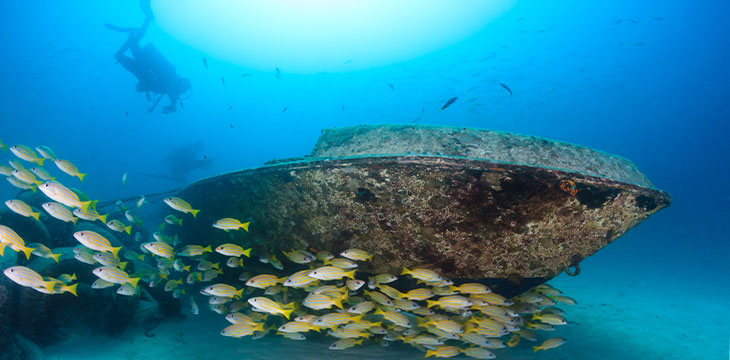|
Getting your Trinity Audio player ready...
|
The waters around the Bahamas are said to be teeming with valuable artifacts—around $100 billion worth. Now, finding the bounty could get a little easier with the help of blockchain technology. The concept comes by way of a blockchain startup called PO8 and is revolutionizing, as it has done with so many industries, how deep-sea treasure hunting is conducted.
PO8 has designed a system that tokenizes shipwrecked items while combating looting and corruption. It also overcomes the lack of oversight that previously resulted in the Bahamian government’s move to ban treasure hunting for almost 20 years. The government began to allow limited treasure hunting about 10 years ago.
Its unique model adheres to responsible practices for salvaging and categorizing artifacts found in the oceans depths, leading to PO8 being approved for salvage expeditions by the Bahamas. Raul Vasquez, chief marketing officer for PO8, said in an interview with Bitcoin Magazine, “Currently PO8 is the only government approved entity with a salvage license to do any underwater salvaging in territorial waters belonging to the Bahamas.”
PO8 uses an Ethereum-based platform and ERC-721 functionality to create non-fungible tokens (NFT), the value of which is calculated against the collateral value of items recovered during the expeditions. Each NFT has its own cryptographically-certified smart contract using unique asset data. PO8 points out that anyone from anywhere in the world can own an NFT; however, currently the PO8 artifacts are kept in PO8’s custody.
Vasquez explained, “For example, let’s say PO8 finds a rare artifact worth millions. The physical artifact would remain under the custody of PO8 for continued study by the archaeology community or to be exhibited in museums for the larger public good, while the digital ownership of the NFT can be anywhere around the world. Now, the real ownership of an asset is determined by its NFTDAPP.”
The company hopes to launch a marketplace later this year, called PAZAR, where individuals can auction, lease, trade, buy, sell or leverage the tokens. Through the use of PO8’s distributed application (DApp) Maritime Artifact Data System (MADS), used to analyze massive amounts of data from sonar, electromagnetic and imagery sources, land-based explorers can also participate in the treasure hunting expeditions. The individuals who contribute through MADS will earn NTFs.
According to the project’s white paper, “Individuals, rather than corporations and governments, will play a more vital role in the recovery, conservation, exhibition and ownership of these artifacts. Decentralization of the industry will allow millions more to participate in the experience and bear witness to history encapsulated underwater for centuries. What was once only accessible to a few can now be shared with eager enthusiasts all over the world.”
If any recoveries are made through PO8, the government, insurers and foundations involved in the particular expedition will be paid first. After that, 50% of the artifacts will be sold on PO8’s auction platform, with the other 50% being retained by the company to be used in exhibitions and for educational programs.

 03-04-2026
03-04-2026 




